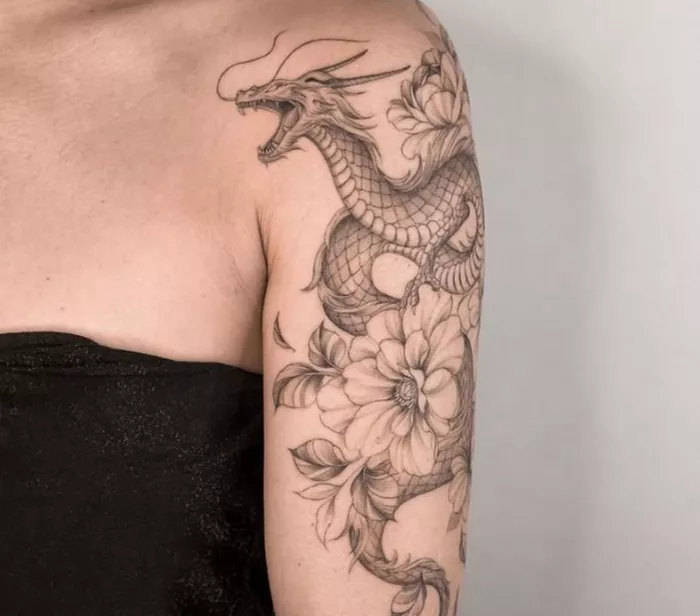Dragon tattoos are captivating symbols that often invoke curiosity and debate. While many admire their beauty and meaning, others question whether they carry negative connotations. This article explores the various perspectives surrounding dragon tattoos, delving into cultural significance, personal implications, and societal perceptions.
1. Understanding the Symbolism of Dragons
1.1 Cultural Significance of Dragons
Dragons hold different meanings across cultures. In Eastern traditions, they symbolize strength and good fortune, while in Western contexts, they are often associated with chaos and destruction. Understanding these cultural backgrounds is vital in discussing whether dragon tattoos can be seen as “bad.”
1.2 Personal Meanings
For many individuals, dragon tattoos represent personal empowerment, transformation, or resilience. Exploring how these meanings can vary among individuals helps in assessing their overall impact.
2. The Perception of Tattoos in Society
2.1 Historical Context
Tattoos have been viewed differently throughout history. Once regarded as markers of criminality or rebellion, their modern acceptance contrasts sharply with past perceptions. Understanding this evolution can shed light on contemporary views of dragon tattoos.
2.2 Current Trends in Tattoo Acceptance
With tattoos gaining popularity, societal acceptance is growing. However, certain designs, including dragons, still evoke mixed feelings. Analyzing public sentiment helps clarify whether dragon tattoos are perceived negatively.
3. The Case Against Dragon Tattoos
3.1 Cultural Appropriation Concerns
Some argue that dragon tattoos, especially when inspired by Eastern traditions, can be seen as cultural appropriation. This raises questions about authenticity and respect, potentially painting dragon tattoos in a negative light.
3.2 Stereotypes and Misinterpretations
Dragons are often associated with negative traits in Western culture, such as greed or destructiveness. This stereotype may lead some to view dragon tattoos as undesirable or “bad.”
3.3 Personal Experiences and Regrets
Many individuals share stories of regretting their tattoos, including dragons. Understanding these personal narratives can illuminate potential downsides of getting a dragon tattoo.
See also: The Price of Power: Understanding the Cost of Dragon Tattoos
4. The Case for Dragon Tattoos
4.1 Positive Cultural Representation
Many artists and wearers of dragon tattoos strive to honor the rich history and meaning of dragons in their respective cultures. This positive representation can challenge the notion that dragon tattoos are inherently bad.
4.2 Empowerment and Identity
For countless individuals, dragon tattoos symbolize strength, courage, and personal growth. Examining these empowering narratives provides a counterpoint to the argument against dragon tattoos.
4.3 Artistic Expression
Dragon tattoos are often seen as works of art, showcasing the tattooist’s skill and the wearer’s individuality. Celebrating this form of artistic expression challenges negative perceptions.
5. The Psychological Impact of Dragon Tattoos
5.1 Identity and Self-Expression
Tattoos, including dragon designs, often play a significant role in personal identity. Exploring how dragon tattoos contribute to self-expression helps illustrate their positive aspects.
5.2 Mental Health Perspectives
Some individuals report that their tattoos, including dragons, provide emotional comfort or serve as reminders of personal strength during difficult times.
6. Dragon Tattoos in Popular Culture
6.1 Representation in Media
Dragons frequently appear in literature, films, and art, often portrayed as powerful, noble creatures. This portrayal can influence perceptions of dragon tattoos in society.
6.2 Influences on Tattoo Trends
Popular media can significantly impact tattoo trends, leading to increased interest in dragon tattoos and shaping their cultural significance.
7. Navigating the Decision to Get a Dragon Tattoo
7.1 Personal Reflection
Before getting a dragon tattoo, individuals should reflect on their motivations and what the design represents to them personally.
7.2 Research and Cultural Awareness
Understanding the cultural significance of dragons and ensuring respectful representation can mitigate concerns about cultural appropriation.
7.3 Consultation with Artists
Engaging with tattoo artists who specialize in dragon designs can provide insights into the meaning and implications of the chosen tattoo.
8. Conclusion: A Balanced Perspective on Dragon Tattoos
Dragon tattoos embody a complex interplay of meanings, cultural significance, and personal expression. While there are valid arguments for both sides, the ultimate decision to get a dragon tattoo should come from a place of informed understanding and personal connection. By considering the cultural, artistic, and psychological aspects, individuals can make choices that resonate with their identities and values.
This exploration reveals the duality of dragon tattoos, highlighting that their perception is not universally negative or positive. Instead, they represent a multifaceted symbol that can carry diverse meanings, ultimately reflecting the wearer’s journey and beliefs. Whether viewed as a bad choice or a powerful statement, dragon tattoos continue to captivate and inspire.
You Might Be Interested In
Are Dragon Tattoos Offensive? Cultural Contexts

